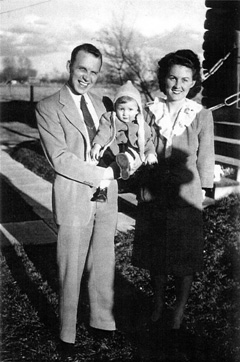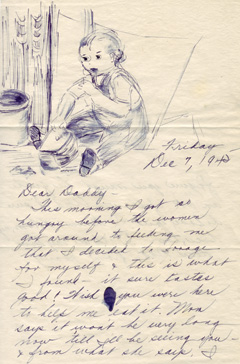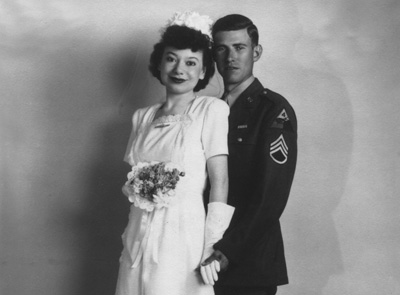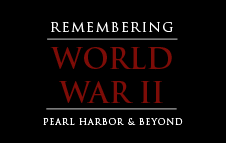
Refuge is found in the arms of loved ones. Wartime separation was heart wrenching; however, there was refuge to be found in letters from home. The benefit was reciprocal. Families waited anxiously for letters from servicemen in training camps and overseas. While letters were no substitute for being together, they did provide a temporary refuge.
Ted and Marné Tuttle were married on July 26, 1943 shortly before Ted’s deployment. Their oldest son, David, was born in December 1944 and was 13 months old before he met his father. The Tuttles’ letters are filled with everyday happenings, love, tenderness, hope and longing. On July 2, 1945, Ted wrote Marné:

Photograph of Ted, David, and Marné Tuttle reunited after WWII
Circa 1946
I love you, my darling. Oh, how I love you. I wish I could be near you to love you and kiss you and hold you close to me, Marné.
Yesterday we held a district conference. I was called on to speak even tho I wasn’t on the program. We had three sessions without even stopping for lunch. It was very good & enjoyed by all.
At home Marné faced the challenges of caring for their young son. On December 7, 1945, Marné drew a picture of little Davy getting into mischief. Under the sketch of his misdeed she assumed David’s persona and had him write the following to his father:
Dear Daddy—

Letter to Ted Tuttle from Marné and David Tuttle on 7 December 1945. Courtesy of Elder A. Theodore Tuttle Family.
This morning I got so hungry before the women got around to feeding me that I decided to forage for myself and this is what I found—it sure tastes good! Wish you were here to help me eat it. Mom says it won’t be very long now till I’ll be seeing you — & from what she says, I figure you must be quite an ok fellow. And I sure do love you. I know Mommy does, too.
With all my love, dear Dad, from Davy.
The Tuttles were reunited in 1946 and in 1958 Ted became Elder A. Theodore Tuttle, a member of the Seventy of The Church of Jesus Christ of Latter-day Saints.
Mary Agnes Gall
In 1942 Mary Agnes Gall randomly selected a name from the list of servicemen displayed in her local post office. As she told Richard Hissrich in the first letter that she sent him, writing to him was a better way to do her civic duty than the disastrous sweaters she knitted for the Red Cross. Eventually, their letters became love letters. Richard and Mary met while he was on pass.
 Richard and Mary Hissrich
Richard and Mary HissrichShortly after their meeting, he proposed to Mary in a letter and they were married on his next leave. Hissrich was stationed in Europe when their daughter was born. She was two before she met her father.

